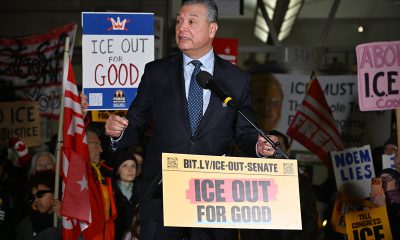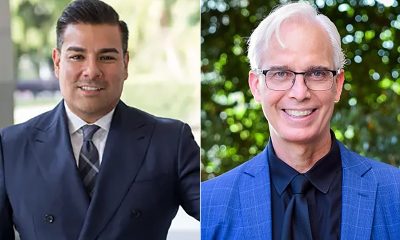News
Meet the LGBT staffers — the power behind the lawmakers
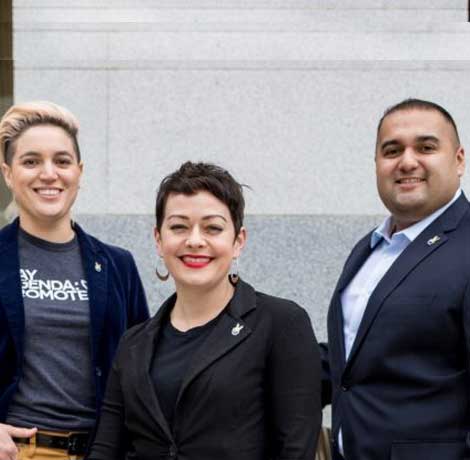
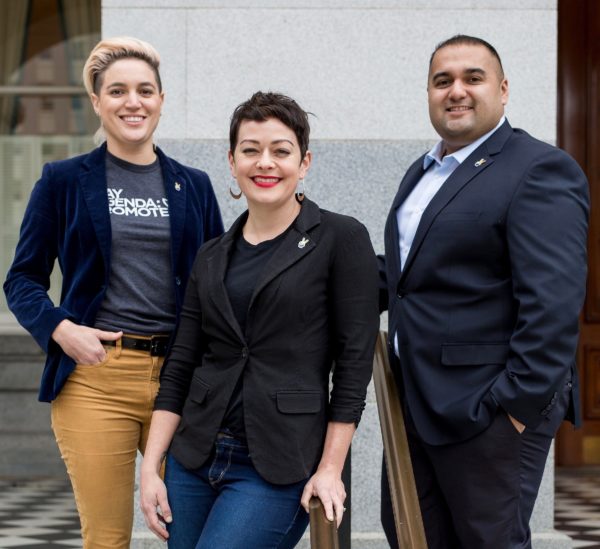
January 20, 1961. Thousands of young people gathered around their television sets to watch John F. Kennedy, America’s second youngest President, deliver his stirring Inaugural Address.
“We dare not forget today that we are the heirs of that first revolution. Let the word go forth from this time and place, to friend and foe alike, that the torch has been passed to a new generation of Americans,” said JFK, 43, glowing in that cold winter day. “And so, my fellow Americans: ask not what your country can do for you — ask what you can do for your country.”
Awakened to the heartbeat of patriotism, young people rushed to join the Peace Corp or find or create other noble ways to be of public service. Everything felt new. Splashes of color emboldened the counter-culture movement to wiggle like a butterfly out of the black and white conformity of the 1950s and indulge in a fresh freedom of expression.
Almost 57 years later, a new generation—including LGBT youth—is emerging out of stultifying siloes manufactured by the privileged to contain thousands of young people straining to be free from biased rules and outmoded definitions of progress. Many of these young people seem invisible – and yet they are the power behind the lawmakers and being of service in a country in which everyone, theoretically, is equal under the rule of law. And in California, the next generation of lawmakers is welcome.
“Engaging millennials in the political process – whether through voter registration and participation, or by promoting them to senior leadership roles in our government is good for the future of California. I’m fortunate to have talented, hardworking advisors whose diverse backgrounds and perspectives make me a better Secretary of State,” Sec. of State Alex Padilla tells the Los Angeles Blade.
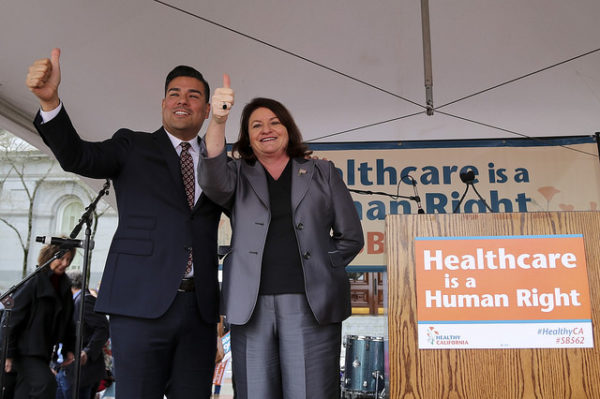
Out State Sens. Ricardo Lara and Toni Atkins introduce Healthcare for All bill (Photo via Facebook)
And today, young new heroes like Ricardo Lara—who came out at San Diego State “ready to fight”—have worked hard and risen through the ranks, proudly representing both the LGBT and Latino communities. On Nov. 6, he made California history becoming the first openly gay man elected statewide as Insurance Commissioner.
“Growing up when California Republicans like Gov. Pete Wilson were leading the charge against people who looked and loved the way I do was a rude awakening,” Lara tells the Los Angeles Blade. “My parents had come to the U.S. without papers and became citizens. I felt like this was my country, but the hatred made me feel like a stranger. As a student I joined the campaigns against laws to deny undocumented immigrants the place in our society they had earned through their contributions to our state. That led to me to seek out mentors who stood against bigotry, and when I had my chance to run for Assembly, I took it.”
There was never a question that Lara would run for office “open and unabashed. As Harvey Milk said, ‘burst down the closet doors once and for all, stand up and start to fight,’” Lara says. “I had the opportunity to work with brave leaders like Marco Firebaugh, who wrote the law treating undocumented students the same as Californians in college admissions. He proudly represented people who had never had a voice, making sure that gender or immigration status was no obstacle to their success. After I was elected I got to go back to school as a David Bohnett LGBT Leadership Fellow, where I met other young leaders dedicating themselves to serve.”
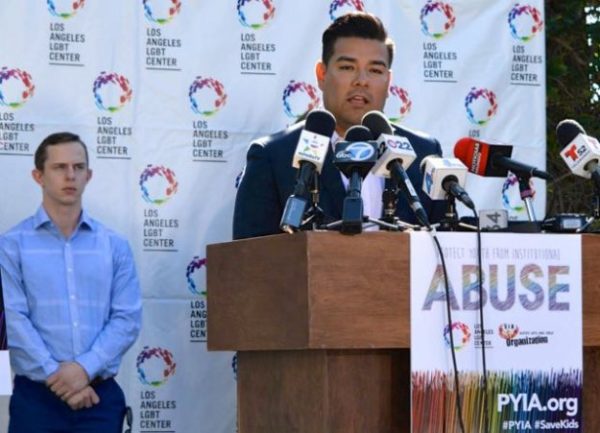
Sen. Ricardo Lara’s SB 524, “Protecting Youth from Institutional Abuse Act,” regulating the “troubled teen” industry was signed by Gov. Brown in Oct. 2016 (Photo by Karen Ocamb)
Lara now gives back what he received. “I am always excited when a new leader is elected who has never served before, at whatever level. As those who have walked this path, it’s our job to remind them that being courageous in their actions is the way to be true to the people who elected you,” he says.
“I didn’t grow up knowing about Bayard Rustin or Harvey Milk. But when I finally did, the lesson I took was that we can’t treat our history as separate from others’. We have to intertwine our efforts for LGBT equality with those of immigrants and their children, women, people living in poverty, African Americans. That’s how we will achieve justice,” Lara says.
Lara is humble about his own achievements. “Making history as the first LGBT leader elected statewide in California history is humbling. It tells me we have a long way to go to deliver on our values. We will truly make history when that is no longer a question any LGBT person has to answer,” Lara says.
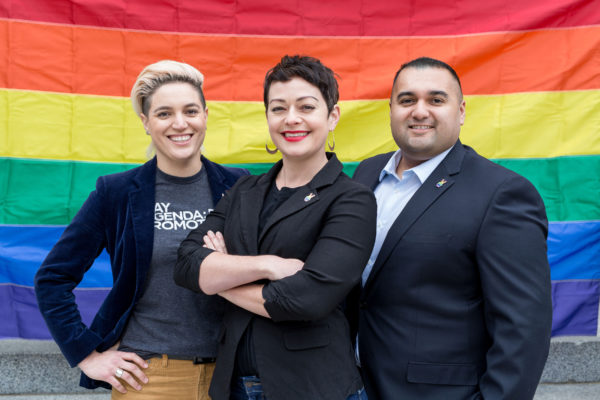
Alina Hernandez, Carrie Holmes, Jesse Melgar (Photo courtesy JZSquared Photography)
Today, young LGBT staffers include Deputy Secretary of State Jesse Melgar, 31, Legislative Director Carrie Holmes, 39, and LGBT Legislative Caucus consultant Alina Hernandez, 32. LGBT staffers also work in the executive branch, the state senate, the state assembly and as advocates — out government operatives who work on the inside of California’s halls of power, with over 100 bright LGBT minds influencing public policy across the golden state each day.
Melgar is already a political veteran. A former communications director for Equality California, the California Latino Legislative Caucus and Lara in 2016, Padilla appointed him Deputy Sec. of State and Chief Communications Officer to serve as a key player advancing Padilla’s voting rights agenda.
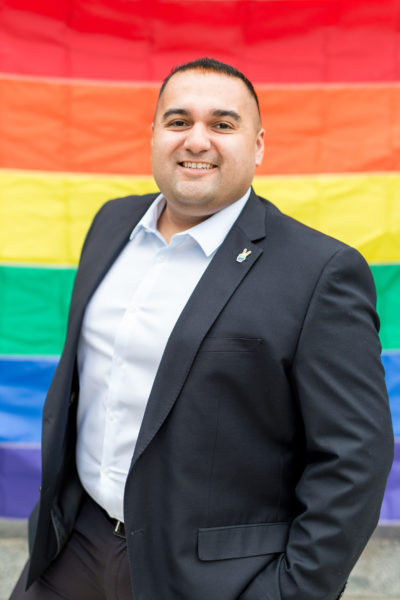
Jesse Melgar (Photo courtesy JZSquared Photography)
“If we don’t step up, we get stepped on. When we think about immigrant rights, LGBTQ rights, voting rights – they are all won or lost depending on how active and engaged our communities are,” Melgar tells the Los Angeles Blade. “I saw this growing up, studied civil rights and inequality in college, and decided to turn my passion for social justice into a career in public service. Having diversity in all levels of leadership is important, particularly considering the current national political climate.”
Melgar was inspired by mentors. “I am where I am today thanks to the support of my family, my partner and incredible bosses and mentors who have supported me throughout my career. I’ve had a front row seat learning from bold leaders like Secretary of State Alex Padilla, Insurance Commissioner-elect Ricardo Lara, Riverside Assemblyman Jose Medina and so many others. It’s inspiring to see leaders who look like you, from similar backgrounds, defy odds and obstacles and lead with authenticity, heart and purpose. It’s humbling when bosses take the time to show you the ropes and help you realize your own potential.”
Melgar recognizes his responsibility to mentor others. “Someone pushed the door open for us so it’s on us to keep those doors open,” he says. “This is particularly true for LGBTQ staff who maybe weren’t comfortable being out at home or in their communities or at previous jobs. By fostering an open, accepting environment that values diversity, we invite younger staffers to bring their full selves to work. We show them that their perspectives matter and that they are valued members of our teams, as they are.”
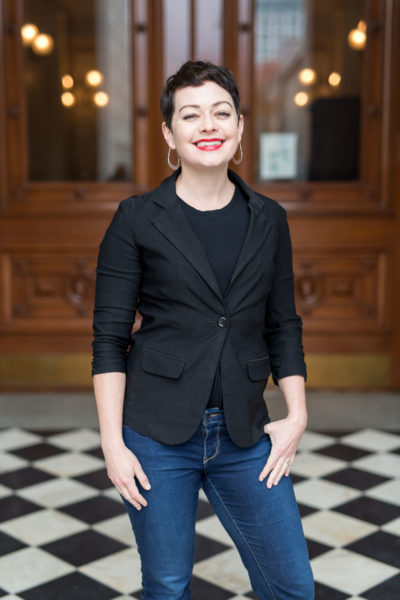
Carrie Holmes (Photo courtesy JZSquared Photography)
Carrie Holmes, Legislative Director for Sen. Jim Beall and President of the Capitol LGBTQ Association, says she’s a couple of years too old to be a millennial. “But I got a late start in my career so I’m generally in the millennial peer group.” Two personal goals: “I want to get my deadlift up to 300 pounds this year, and get a full night of sleep (I’m not joking, I have an 8-month old baby).”
Holmes says the Capitol Lesbian, Gay, Bisexual, Transgender and Queer Association, founded in 2017 by Bish Paul, an Assembly staffer, is the first non-profit LGBTQ staff association in the country. “Any individual who has expressed an interest in public policy and is-or wants to be- engaged in statewide policy is welcome to join. Our membership includes legislative and administration staff, lobbyists, and policy stakeholders. Our purpose is to recruit and retain LGBTQ individuals, and provide professional development and networking opportunities.”
The Association hosts a number of events, provides an immediate support system for new LGBT staffers, started the Rainbow mentors program “to connect seasoned career folks with those either looking to start working in policy or looking for a career change.”
“I think, within the LGBTQ community, we must take the time to reach out and open doors for others,” she says, “especially in the policy and political realm. It can feel like a very exclusive space and those of us working here need to look around, see who isn’t represented, and make the changes needed.”
Holmes was motivated to get involved in politics by working in non-profits and educational settings. “I kept running into problematic state laws and funding streams,” she says. “I realized how much it mattered who was in power, and became interested in being part of the process of shaping the laws. I got into this path as part of the Capital Fellows program in 2010, and I was the only queer person in my fellowship class. Every one of us has been in the position where we are the only person around who can speak to how a vote, a law, an amendment could impact the queer community or other vulnerable populations.
Holmes intends to step back from the Association this year and is encouraging younger board members to take leadership roles.
“I want to see the influence of queer people of color grow. We want to create a paid internship or fellowship program targeted to the LGBTQ community,” Holmes says. “Too many people have to work for free to get their foot in the door, and that just re-enforces existing privilege and power. I want to see Trans women of color hired in the Capitol. And elected. We are chipping away to make the culture more inclusive—we collaborated with the Caucus and leadership in the Legislature to get changes to the dress code and include pronouns on business cards. These are small steps. We want to make our reach broader to include folks working across the state, not just Sacramento.”
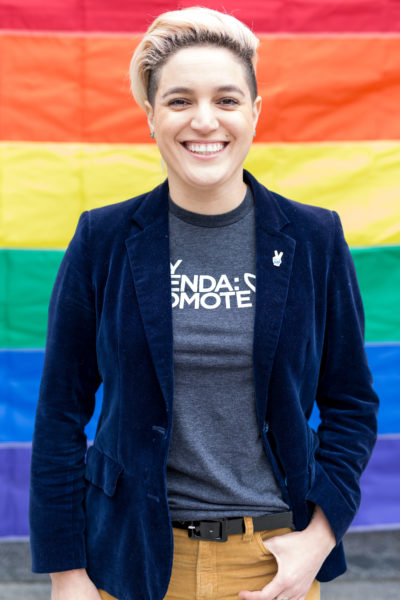
Alina Hernandez (Photo courtesy JZSquared Photography)
Alina Hernandez, 32, is the fierce, funny, former techie consultant to the California Legislative LGBT Caucus whose primary goal is to live a happy life.
“I’m a professional gay,” Hernandez says. “I am the manager/agent of the most badass group of openly LGBT elected officials California has ever seen. I’m a little biased.”
In 2018, she staffed numerous LGBT specific legislative bills and resolutions, managed listening tours, appointment workshops, and “I helped to facilitate obtaining the option for capital staff to choose to add their preferred pronouns on business cards. At the end of the day, I will go to battle for what is right and inclusive,” which she sees as a community effort.
How Hernandez got into politics is a funny question to answer.
“Short answer, Trump! Long answer, after high school, I started to study graphic design with a heavy focus on typography. That soon turned into a career in tech as a hardware/software support technician. After many years of fixing computers, cleaning dirty keyboards, and truly enjoying life as a techie, I was searching for something new,” she says.
“Fast forward to January of 2016, I am sitting at a bar in Vegas by myself while I was waiting for a friend to get off work. I sat next to this guy who ordered the exact same sample beer selection as I did. We bonded over this and soon our conversation turned from beer to life,” Hernandez says. “He gave me this great idea to create a political app. I wasn’t heavy into politics, but I did know technology. I pondered this idea for a while and searched for people to help with this project. I ended up putting that on the back burner.
“In the meantime,” she continues, “I created another small business helping baby boomers bridge the gap between technology and themselves. It was great! You would not believe how excited people get when they learn how to use emojis or FaceTime for the first time. I could feel the ground starting to move under my feet and I was looking around for my next big adventure.”
Hernandez doesn’t know where she’ll be in 10 years. “I’ll always end up where I am supposed to be,” she says. “A great friend once said to me, ‘treat everyone like a celebrity because they are.’ Truth be told, I received a text message that said, ‘California Legislative LGBT Caucus Consultant? You were made for this job.’ I put aside my fear of attempting something I had no experience doing and went full speed ahead. I had no idea what I was getting into or what to expect, but I knew the universe brought this position my way for a reason.”
Hernandez’s Caucus job means she takes lots of meetings, including with “conservative activists who think my very existence is a sin in the eyes of God,” she says. “I also take meetings with people who are struggling to come out or want to share their experiences about being LGBT in this political climate. People trust me with their secrets that they have sometimes not even told their own family. In no way is this an easy job—it takes time and patience. This job cannot be defined by a duty statement.”
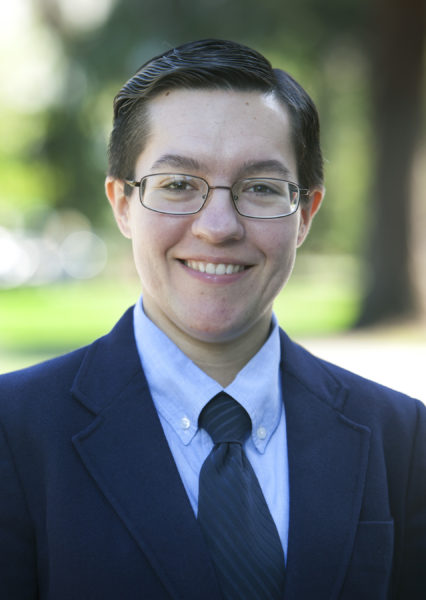
Jo Michael (Photo courtesy Jo Michael)
Jo Michael, 32, Equality California’s legislative manager, knows these stories, having helped shepherd through more than 25 successful pieces of sponsored legislation that included educating lawmakers and the public about LGBT policies, especially regarding the transgender community.
“It’s particularly challenging in the context of doing legislative work in the Capitol,” Michael told his alma mater, McGeorge School of Law. “That can be a significant hurdle…to make clear there is no ‘gay agenda.’ It’s about making sure people are not discriminated against and not excluded from the places other people enjoy access to on a regular and daily basis. It’s about equality and being able to have justice as opposed to being able to have anything that’s special or different.”
Michael, named one of the Best LGBT Lawyers under 40 by the National LGBT Bar Association in 2015, has been working to advance social justice and LGBTQ civil rights since he co-founded his high school’s first Gay-Straight Alliance.
“The roads to many of the advances the LGBTQ community has achieved show that LGBTQ people being open and visible helps change hearts and minds. I’ve been so inspired to see and to be a part of the impact of openly LGBTQ staff in the Capitol community and to advance Equality California’s legislative program in Sacramento for 6 years,” Michael told the Los Angeles Blade on Dec. 7, his final day at Equality California.
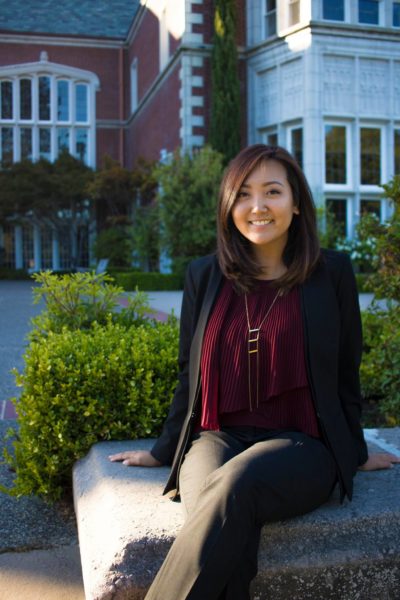
Elle Chen (Photo Elle Chen)
Elle Chen, 23, Legislative Aide to Assemblymember Wendy Carrillo, has also served as a Senior Fellow in the State Senate, consulting on public safety and other policy areas. She has a sense of both the fresh perspective young LGBT staffers can bring to public service, as well as the passion creating the arc of history that led them to the Capitol.
Chen is an Association member for whom intersectionality and interest in a diversity of issues is a given. She is among the new LGBT generation to whom the torch is being passed, answering the call to serve her country, her state and the people.
“You stand on the shoulders of those who come before you,” Chen tells the Los Angeles Blade. “Let history inform your policy perspective and acknowledge the narratives that still have yet to be heard.”
For more information about the Capitol Lesbian, Gay, Bisexual, Transgender and Queer Association, visit their website at CapitolLGBTQ.org. Here are just some of their members. (All photos provided by the Association or from their Facebook page https://www.facebook.com/CapitolLGBTQAssociation )
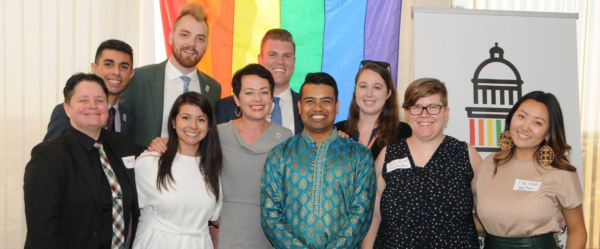
Capitol LGBTQ Association Board
President: Carrie Holmes
Vice President: Deepen Gagneja
Communications Director: Nicole Restmeyer
Treasurer: Brandon Bjerke
External Affairs Director: Biswajit “Bish” Paul
Membership Director: Sean Connelly
Events Director: Sage Warren
Community Outreach Director: Erica Porter
Operations Director: Monica Montano
Fellows & Intern Liaison: Elle Chen
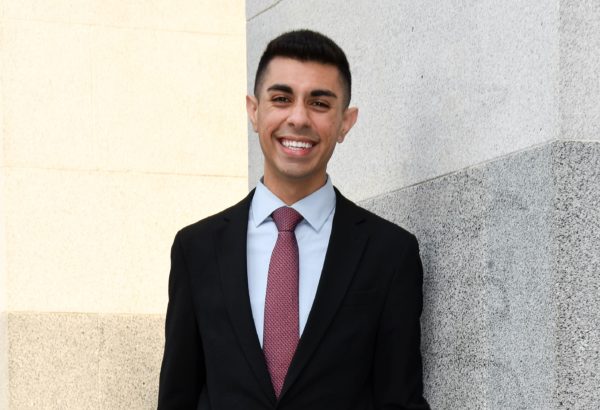
Deepen Gagneja
Age: 24
Senior Legislative Advocate, California Immigrant Policy Center
“It is vital that we acknowledge the intersectionality of the LGBTQ community and advocate for all who face injustice. As a former Capitol staffer, I learned that it’s so important to infuse your personal experiences into policy and earn a seat at the table where decisions are made.”
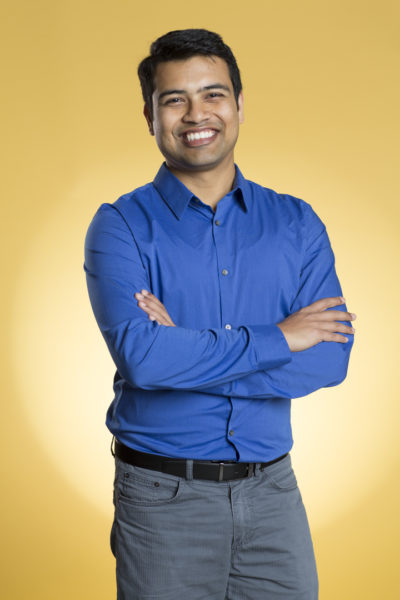
Bish Paul, PhD.
Age: 33
State Policy Manager, TechNet
“As an immigrant, gay, scientist and person-of-color, I have found that often times intersectional voices are missing in our LGBTQ and policymaking communities. I was the founding President of the Capitol LGBTQ Association since I believe that to be given a seat at the table we need to step up, organize, and demand equity.”
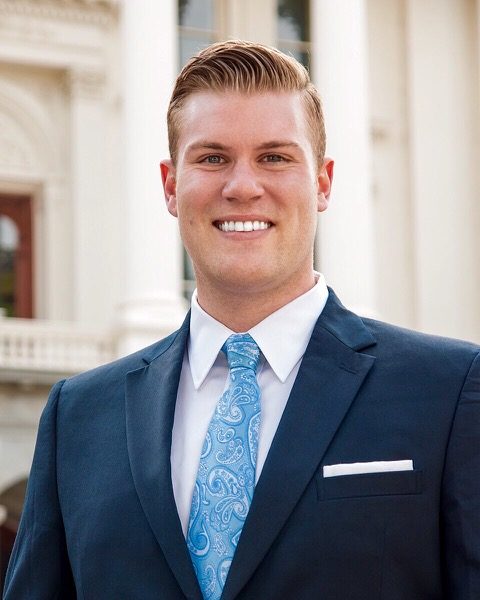
Sean Connelly
Age: 29
Capitol Director, Assemblymember Freddie Rodriguez
“Working in public policy is a great privilege, every day presents a new set of challenges to tackle and problems to solve. It is humbling to know that your work will, hopefully, have a positive impact on someone’s life. As LGBTQ+ people, we are acutely aware of how critical politics and public policy is to building the world we want to live in, not necessarily the one we have today.”
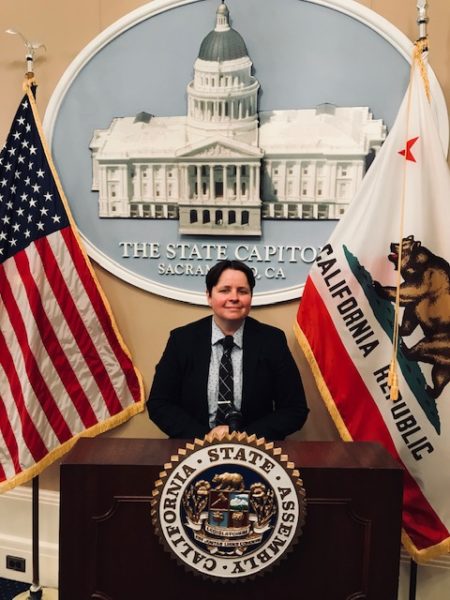
Sage Warren
Age: 29
Victim Services Case Manager, Sacramento LGBT Community Center
“As a social worker, a parent, and an LGBTQ policy advocate, I have learned the importance of fighting for my community’s values and protecting its integrity with every opportunity that arrives.”
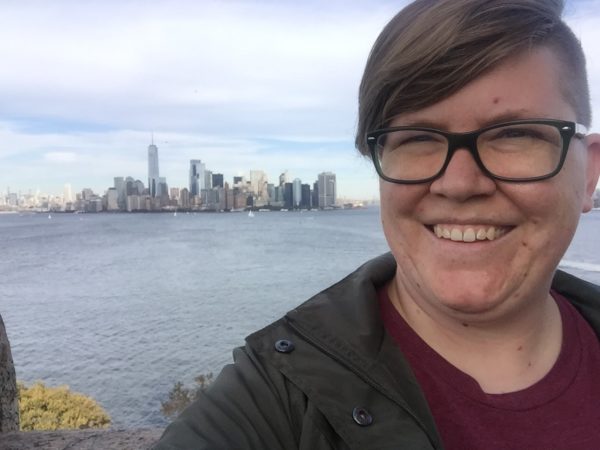
Erica Porter
Age: 27
Committee Assistant, California State Senate Judiciary Committee
“It’s really important for queer folx in politics to stay connected to our community and our history. What’s the point of being in the room where it happens if you can’t bring your community with you?”
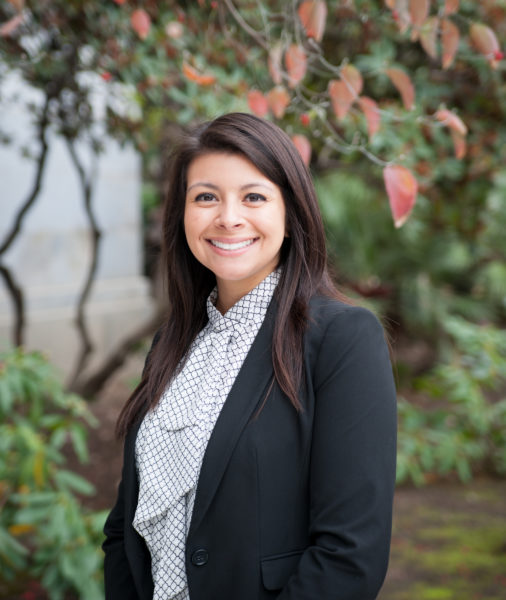
Monica Montano
Age: 29
Graduate Medical Education Director, Physicians for a Healthy California
“It was an absolute humbling experience working within the Capitol and knowing that your work directly impacted all Californians and sometimes the nation.”
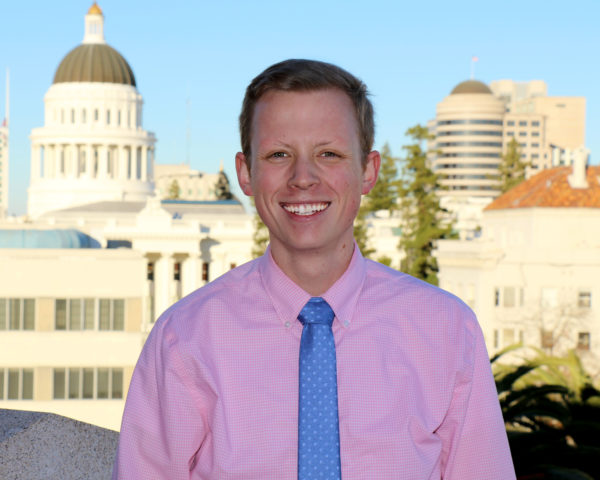
Chris Miller
Age: 23
Press Assistant, California Secretary of State
“Decades of struggle and hardship have made it possible for me to be out in the workplace. While this is not the case in every state, I am proud to serve the State of California as an out gay man. I know that being out at work sends the message that it’s okay to be who you are, and I hope to serve as a mentor to those young gay people entering the workforce.”
Los Angeles
A new “queer summer camp” cycling event rises from the legacy of AIDS/LifeCycle
The LA LGBT Center will host its first ever “Center Ride Out,” a 3-day community cycling adventure from Los Angeles to San Diego.

On April 24, 500 cyclists will meet at Elysian Park before dawn, stretching and preparing for a 110-mile ride through urban scenery and rolling hills. They will be part of the Los Angeles LGBT Center’s inaugural “Center Ride Out,” a 3-day journey that takes riders through Los Angeles and Temecula, reeling to a stop at the San Diego LGBT Community Center.
The cycling adventure is a rejuvenating, communal queer experience that taps into the importance of shared joy and advocacy in the fight to defend LGBTQ+ rights. Its roots are sacred for many queer elders: Center Ride Out rises from the legacy of the cherished AIDS/Life Cycle (ALC), a seven-day cycling adventure from San Francisco to L.A. that formed in 1994 and ended with its last ride in 2025.
In its 31-year run, ALC riders raised over $300 million for HIV and AIDS resources, services, and awareness. This year, Center Ride Out provides a new, exciting extension of this important event, allowing cyclers to raise funds in support of the LA LGBT Center, The San Diego LGBT Community Center, and the LGBTQ Community Center of the Desert.
This support is crucial as LGBTQ+ organizations face a new crisis: widespread defunding. In the last fiscal year, the LA LGBT Center lost $9 million in federal support, according to its CEO Joe Hollendoner. The funding raised by Center Ride Out’s participants will help offset this loss and keep the organization’s various programs and services, from gender affirming care and HIV prevention resources to LGBTQ+ senior and youth support, afloat. “We anticipate further divestment in our work by the Trump administration, [so Center Ride Out] allows people to align their own personal passions with our mission in a broader way,” Hollendoner told the Blade.
Altogether, Center Ride Out participants will cover nearly 200 miles of ground together. At the end of the first 110-mile day from L.A. to Temecula, where riders will get to look at historic landmarks and embark on a museum lunch stop together, the day culminates at campgrounds at Lake Skinner.
Here, riders can take a full rest day at their lakeside camp, where it will exude queer summer camp vibes. There will be massage and medical services, arts and crafts activities, dance parties, and time to relax and connect with the community. “Folks [can] build relationships, have some fun, and feel safe. That’s a feeling a lot of people [need] right now, especially our trans and nonbinary siblings,” Hollendoner said.
Day 3 ends with an 87-mile downhill, coastal ride through the town of Rainbow in northern San Diego County, before ending with a celebratory bash at the San Diego LGBT Community Center.
Hollendoner rode ALC five times while it was active and is excited to be part of this new legacy from its very beginning. “I’ve heard our community elders talk about how powerful it was to be at the start of AIDS/LifeCycle, and the idea that I can be here at the start of Center Ride Out, an event that I hope will go for three decades or longer…It feels really exciting to me,” Hollendoner said.
For newcomers and experienced cyclists alike, Center Ride Out aims to provide an accessible experience: paring down the initial weeklong ALC ride to three days. To take part, cyclists are expected to raise $2,500 by April 10. For those who may struggle to reach this minimum, staff members have established a community fund.
The community fund will also provide scholarships for BIPOC, trans, women, and femme participants — historically underrepresented communities at ALC — as well as microgrants for BIPOC and trans-led teams to encourage a diverse range of cyclists.
Come April, scores of queer cyclists will get to experience this adventure together: one that is both storied and fresh in its purpose, lineage, and joyful expression of queer togetherness. “Center Ride Out is providing an exciting opportunity for people to not only fight back and be in community with one another, but to build resiliency and be surrounded by people who share values around liberation,” Hollendoner said.
To learn how to register, donate to or volunteer for Center Ride Out, more information can be found here. The three-day adventure takes place from April 24 to April 26.
Kristie Song is a California Local News Fellow placed with the Los Angeles Blade. The California Local News Fellowship is a state-funded initiative to support and strengthen local news reporting. Learn more about it at fellowships.journalism.berkeley.edu/cafellows.
Los Angeles
Stonewall Young Democrats bounces back from “quiet year” with Hero Awards

On Saturday, Feb. 7, the Stonewall Young Democrats (SYD), an organization that mobilizes and fosters community for young, LGBTQ+ people, hosted its “Hero Awards” ceremony at Beaches West Hollywood. Under luminous pink light, vibrant crowds of community members showed up to support and celebrate people and organizations spearheading LGBTQ+ visibility, change, and livelihood across L.A. County. Political figures filled the venue wall to wall, including LA Mayor Karen Bass, West Hollywood Mayor John Heilman, West Hollywood Council Member John Erickson, and California Assemblymember Rick Zbur.

Several local advocates and politicians were honored for their queer advocacy and leadership, including City of Los Angeles LGBTQ+ community affairs liaison Carla Ibarra, L.A. Democratic Party Chair Mark Ramos, Congressman Mark Takano, and L.A. County LGBTQ Commission Chair Sydney Rogers. The Los Angeles Blade was also recognized with an Impact Award.
Los Angeles Blade publisher Alexander Rodriguez accepted the award. In his acceptance speech, Rodriguez shared, “We report on and share the struggles of our queer community. We also get to see the resilience and strength our community has, even in the face of adversity. We see firsthand the importance of the Stonewall Young Democrats and the amazing network of people they have put together, as seen here today.”

The Stonewall Young Democrats formed in 2004, immortalizing the 1969 Stonewall riots in its name. The decision to carry the legacies of early gay rights movements is poignant: queer resistance and their enduring battle against political and social marginalization and violence are seared into the organization’s core.
SYD’s President Kanin Pruter is keeping this link to the past alive; it’s a reminder of the interconnectedness of the queer community. “Our history is there for a reason,” Pruter told the Blade. “Without lesbians during the AIDS crisis, we would not be where we are today. And our movement was started by Black trans women.”
This recent Hero Awards marks SYD’s revitalization. After a relatively quiet year, its board is excited to grow its organization, recruit diverse and eager LGBTQ+ folks, and create fruitful opportunities for everyone in the organization to develop their political advocacy and organizing skills.

Most importantly, Pruter hopes that SYD can be a safe, inclusive, and accessible space for any LGBTQ+ person who has felt outcast before. “In a loving and joking way, we’re an island of misfit toys,” Pruter said, who is intentional about creating environments where queer folks who have experienced trauma, isolation, and exclusionary social politics can fit in and belong.
“I want folks to be open, vulnerable and leave any preconceived notions at the door. We come in here [and] we are who we are. We respect each other’s identity, and we’re here to foster a culture where everyone feels welcome.”
Pruter encourages young LGBTQ+ people who are interested in getting involved in SYD, to contact him and learn more about the organization. More information can be found here.
Kristie Song is a California Local News Fellow placed with the Los Angeles Blade. The California Local News Fellowship is a state-funded initiative to support and strengthen local news reporting. Learn more about it at fellowships.journalism.berkeley.edu/cafellows.
Philippines
Philippines Supreme Court rules same-sex couples can co-own property
Advocacy group celebrated landmark decision

The Philippines Supreme Court in a landmark ruling said same-sex couples can co-own property under the country’s Family Code.
The Philippine News Agency on Tuesday notes the court issued its ruling in the case of two women who bought a house in Quezon City, a suburb of Manila, the Filipino capital, before they broke up.
The two women, according to the Philippine News Agency, “agreed to sell the property” after they ended their relationship, “and the registered owner — the respondent — signed a document acknowledging that the other partner paid for half of the purchase and renovations.” The Philippine News Agency notes “the registered owner” later “refused to sell the property and withdrew her earlier acknowledgment of co-ownership, prompting the other partner to file a complaint.”
A Regional Trial Court and the Philippines Court of Appeals ruled against the plaintiff.
The Supreme Court in a 14-page ruling it issued on Feb. 5 overturned the decisions. The Supreme Court published its decision on Tuesday.
“Considering that there is co-ownership between petitioner and respondent, then each co-owner may demand at any time the partition of the thing owned in common, insofar as her share is concerned,” said the Supreme Court in its ruling, according to the Philippine News Agency. “Having rightful interest over the subject property, petitioner has the right to demand the division of the subject property.”
The predominantly Catholic country’s Family Code defines marriage as “a special contract of permanent union between a man and a woman entered into in accordance with law for the establishment of conjugal and family life.” It also states in Article 148 that “in cases of cohabitation” outside of marriage, “only the properties acquired by both of the parties through their actual joint contribution of money, property, or industry shall be owned by them in common in proportion to their respective contributions.”
“In the absence of proof to the contrary, their contributions and corresponding shares are presumed to be equal,” it reads.
The BBC reported the Supreme Court ruling states this provision “applies to all forms of co-habitation,” regardless of the couple’s gender. A Supreme Court press release indicates the decision notes lawmakers and the Filipino government “must address same-sex couples’ rights, as courts alone cannot resolve all related policy concerns.”
“This court does not have the monopoly to assure the freedom and rights of homosexual couples,” it reads. “With the political, moral, and cultural questions that surround the issue concerning the rights of same-sex couples, political departments, especially the Congress must be involved to quest for solutions, which balance interests while maintaining fealty to fundamental freedoms.”
LGBT Pilipinas, a Filipino advocacy group, welcomed the ruling.
“This ruling marks a monumental step forward in the legal recognition of LGBTQ+ families and relationships in the country,” it said in a statement.
LGBT Pilipinas added the ruling “lays a crucial legal foundation for broader recognition of same-sex relationships and strengthens the push for comprehensive anti-discrimination protections.”
“This is a win not only for the LGBTQ+ community, but for fairness and justice in Philippine society as a whole,” said the group.
New York
Pride flag removed from Stonewall Monument as Trump targets LGBTQ landmarks
The new NPS policy targets Pride flags amid consistent efforts from the Trump administration to minimize LGBTQ history

A rainbow Pride flag flying at the Stonewall National Monument in New York was removed at the direction of Trump administration officials at the National Park Service, according to a source familiar with the matter who spoke to the Blade on condition of anonymity.
The source said the move had been in the works for weeks and is part of ongoing efforts by the Trump-Vance administration to erase LGBTQ identity from federally controlled landmarks.
In response to the Blade’s request for information about the new flag policy, the National Park Service provided the following statement:
“Current Department of the Interior policy provides that the National Park Service may only fly the U.S. flag, Department of the Interior flags, and the Prisoner of War/Missing in Action flag on flagpoles and public display points. The policy allows limited exceptions, permitting non-agency flags when they serve an official purpose. These include historical context or reenactments, current military branch flags, flags of federally recognized tribal nations affiliated with a park, flags at sites co-managed with other federal, state, or municipal partners, flags required for international park designations, and flags displayed under agreements with U.S. Citizenship and Immigration Services for Naturalization ceremonies.”
The statement also included official guidance on the display of non-agency flags issued by Trump-appointed National Park Service Director Jessica Bowron.
The Blade reached out to other organizations to confirm the status of the Pride flag last week, including the Stonewall National Monument Visitor Center, the NYC Landmarks Preservation Commission, and the National Parks Conservation Association. None were able to provide details about whether the flag was still flying at that time but it has since been removed.
This action aligns with other moves targeting and erasing LGBTQ history. In September, the Blade reported that three organizations originally slated to receive more than $1.25 million from the National Park Service’s Underrepresented Communities Grant Program would no longer receive funding: In Washington, D.C., the Preservation League had been awarded $75,000 to document LGBTQ+ historic resources. In Providence, R.I., the Preservation Society was slated for $74,692 to conduct an LGBTQ+ survey and prepare a National Register nomination. And in New York, the Fund for the City of New York, Inc., had been awarded $32,000 to nominate the residence of Bayard Rustin — the iconic civil rights and LGBTQ activist — as a National Historic Landmark.
Florida
Disney’s Gay Days ‘has not been canceled’ despite political challenges
GayDays is moving forward with its planned LGBTQ meet-up

Gay Days in Orlando is preparing for its 2026 gathering though organizers have yet to release full details.
Concerns emerged about the status of the annual meetup of LGBTQ people at Walt Disney World in Orlando, Fla., after social media posts and multiple news outlets reported the event would not take place this year.
In response to inquiries from the Blade, Josh Duke, co-owner of Gay Days, clarified that an update would come this week.
“At this time, I’d like to clarify that Gay Days Orlando has not been canceled,” an email to the Blade said. “We are currently finalizing details regarding our plans for 2026 and will be making an official announcement later this week.”
Earlier this week, Gay Days posted about a pause in their plans for the annual meeting, which quickly gained traction online.
In an official statement on social media, Gay Days organizers cited several factors behind what had initially appeared to be a cancellation of their 2026 event.
“Changes to our host hotel agreement, the loss of key sponsorship support, and broader challenges currently impacting LGBTQIA+ events nationwide made it impossible to deliver the experience our community deserves,” organizers wrote. However, the statement added, “This is a pause — not an ending.”
In a longer message shared with supporters, organizers elaborated on that now-reversed decision.
“Gay Days Family — it is with very heavy hearts that we share Gay Days 2026 will not take place this year. This was an incredibly difficult decision and one that was only made after every possible option was explored.
“Gay Days has always been more than an event — it is community, family, and a place where so many memories are made. While this pause is painful, it also gives us the opportunity to step back, listen, and begin shaping a stronger and reimagined GayDays for the future. Thank you for your continued love, patience, and support. This is not goodbye — it’s a reset, and we look forward to creating the future of GayDays together.”
GayDays, which began in 1991, encourages queer Disney fans to visit the Orlando theme park while wearing red shirts to identify one another. Originally focused on gay men reclaiming the childhood joy often denied due to homophobia, the event has expanded over the years to include LGBTQ+ families on summer vacations and queer couples honeymooning in the Magic Kingdom.
Disney made history in 2019 by holding its first-ever official Pride event at its European park, Disneyland Paris. In 2023, Disneyland California hosted the first U.S. official Pride event.
Concerns about the potential cancellation had arisen amid broader challenges affecting LGBTQ events nationwide. These include changes in hotel agreements, sponsorship support, and Florida’s increasingly restrictive anti-LGBTQ policies under Gov. Ron DeSantis. Florida currently has an equality score of -3.00 out of 49 from the Movement Advancement Project, which evaluates states based on policies affecting relationship and parental recognition, nondiscrimination, religious exemptions, LGBTQ youth, healthcare, criminal justice, and transgender identity documentation.
Recent legislation in Florida has included prohibitions on hormone replacement therapy for transgender minors, restrictions on adult access to treatment, bans on drag performances for those under 18, bathroom bans for transgender people in state buildings, and expansion of the Parental Rights in Education Act, commonly called the “Don’t Say Gay” law. These measures limit public school instruction or discussion about sexual orientation and gender identity.
Gay Days Anaheim is scheduled to take place at Disneyland Resort in September.
Disney has also maintained a focus on Pride, reporting in 2022 that proceeds from Pride merchandise benefited numerous LGBTQ organizations, including GLSEN, PFLAG, The Trevor Project, Zebra Coalition, the Los Angeles LGBT Center, the LGBT Center Orange County, the San Francisco LGBT Center, and the Ali Forney Center. Pride merchandise sold internationally supports local LGBTQ organizations in those regions.
More details about this event are expected to be released on Friday.
Italy
Olympics Pride House ‘really important for the community’
Italy lags behind other European countries in terms of LGBTQ rights

The four Italian advocacy groups behind the Milan Cortina Winter Olympics’ Pride House hope to use the games to highlight the lack of LGBTQ+ rights in their country.
Arcigay, CIG Arcigay Milano, Milano Pride, and Pride Sport Milano organized the Pride House that is located in Milan’s MEET Digital Culture Center. The Los Angeles Blade on Feb. 5 interviewed Pride House Project Manager Joseph Naklé.
Naklé in 2020 founded Peacox Basket Milano, Italy’s only LGBTQ+ basketball team. He also carried the Olympic torch through Milan shortly before he spoke with the Blade. (“Heated Rivalry” stars Hudson Williams and Connor Storrie last month participated in the torch relay in Feltre, a town in Italy’s Veneto region.)
Naklé said the promotion of LGBTQ+ rights in Italy is “actually our main objective.”
ILGA-Europe in its Rainbow Map 2025 notes same-sex couples lack full marriage rights in Italy, and the country’s hate crimes law does not include sexual orientation or gender identity. Italy does ban discrimination based on sexual orientation in employment, but the country’s nondiscrimination laws do not include gender identity.
ILGA-Europe has made the following recommendations “in order to improve the legal and policy situation of LGBTI people in Italy.”
• Marriage equality for same-sex couples
• Depathologization of trans identities
• Automatic co-parent recognition available for all couples
“We are not really known to be the most openly LGBT-friendly country,” Naklé told the Blade. “That’s why it (Pride House) was really important for the community.”
“We want to use the Olympic games — because there is a big media attention — and we want to use this media attention to raise the voice,” he added.

Naklé noted Pride House will host “talks and roundtables every night” during the games that will focus on a variety of topics that include transgender and nonbinary people in sports and AI. Another will focus on what Naklé described to the Blade as “the importance of political movements now to fight for our rights, especially in places such as Italy or the U.S. where we are going backwards, and not forwards.”
Seven LGBTQ+ Olympians — Italian swimmer Alex Di Giorgio, Canadian ice dancers Paul Poirier and Kaitlyn Weaver, Canadian figure skater Eric Radford, Spanish figure skater Javier Raya, Scottish ice dancer Lewis Gibson, and Irish field hockey and cricket player Nikki Symmons — are scheduled to participate in Pride House’s Out and Proud event on Feb. 14.
Pride House Los Angeles – West Hollywood representatives are expected to speak at Pride House on Feb. 21.
The event will include a screening of Mariano Furlani’s documentary about Pride House and LGBTQ+ inclusion in sports. The MiX International LGBTQ+ Film and Queer Culture Festival will screen later this year in Milan. Pride House Los Angeles – West Hollywood is also planning to show the film during the 2028 Summer Olympics.
Naklé also noted Pride House has launched an initiative that allows LGBTQ+ sports teams to partner with teams whose members are either migrants from African and Islamic countries or people with disabilities.
“The objective is to show that sports is the bridge between these communities,” he said.
Bisexual US skier wins gold
Naklé spoke with the Blade a day before the games opened. The Milan Cortina Winter Olympics will close on Feb. 22.
More than 40 openly LGBTQ+ athletes are competing in the games.
Breezy Johnson, an American alpine skier who identifies as bisexual, on Sunday won a gold medal in the women’s downhill. Amber Glenn, who identifies as bisexual and pansexual, on the same day helped the U.S. win a gold medal in team figure skating.
Glenn said she received threats on social media after she told reporters during a pre-Olympics press conference that LGBTQ+ Americans are having a “hard time” with the Trump-Vance administration in the White House. The Associated Press notes Glenn wore a Pride pin on her jacket during Sunday’s medal ceremony.
“I was disappointed because I’ve never had so many people wish me harm before, just for being me and speaking about being decent — human rights and decency,” said Glenn, according to the AP. “So that was really disappointing, and I do think it kind of lowered that excitement for this.”
Puerto Rico
Bad Bunny shares Super Bowl stage with Ricky Martin, Lady Gaga
Puerto Rican activist celebrates half time show

Bad Bunny on Sunday shared the stage with Ricky Martin and Lady Gaga at the Super Bowl halftime show in Santa Clara, Calif.
Martin came out as gay in 2010. Gaga, who headlined the 2017 Super Bowl halftime show, is bisexual. Bad Bunny has championed LGBTQ+ rights in his native Puerto Rico and elsewhere.
“Not only was a sophisticated political statement, but it was a celebration of who we are as Puerto Ricans,” Pedro Julio Serrano, president of the LGBTQ+ Federation of Puerto Rico, told the Washington Blade on Monday. “That includes us as LGBTQ+ people by including a ground-breaking superstar and legend, Ricky Martin singing an anti-colonial anthem and showcasing Young Miko, an up-and-coming star at La Casita. And, of course, having queer icon Lady Gaga sing salsa was the cherry on the top.”
La Casita is a house that Bad Bunny included in his residency in San Juan, the Puerto Rican capital, last year. He recreated it during the halftime show.
“His performance brought us together as Puerto Ricans, as Latin Americans, as Americans (from the Americas) and as human beings,” said Serrano. “He embraced his own words by showcasing, through his performance, that the ‘only thing more powerful than hate is love.’”
AIDS and HIV
Congresswoman Maxine Waters introduces new resolution for National Black HIV/AIDS Awareness Day
H.Res.1039 supports more funding, resources and awareness for Black American communities, who are disproportionately impacted by HIV/AIDS.

Today is National Black HIV/AIDS Awareness Day. Advocates established this day of awareness on Feb. 7, 1999, and nearly 30 years later, Black communities in the U.S. continue to be disproportionately impacted by HIV.
On Wednesday, California Congresswoman Maxine Waters introduced H.Res.1039, a resolution that supports the goals of National Black HIV/AIDS Awareness Day and calls for a collective commitment to address disparities Black people with HIV face. Waters represents the state’s 43rd congressional district, a majority Black and Brown population comprising South L.A. cities like Hawthorne, Gardena, and Inglewood.
In the resolution, Waters urges state and local government officials, as well as their public health agencies, to acknowledge the importance of this awareness day and encourage their constituents to get tested for HIV. The resolution also requests that the Secretary of Health and Human Services prioritize distributing grant funding to minority-led, HIV organizations and community-based approaches to fighting HIV stigma, LGBTQ+ discrimination, and racism.
In 2023, young Black men accounted for 47% of new HIV diagnoses among youth, while young white men made up 3% of these diagnoses, according to a new Williams Institute report. Black women also have the highest HIV diagnosis rate among women, and Black community members overall represent 38% of new HIV diagnoses and 39% of people living with HIV in the U.S., despite being only 12% of the national population.
Beyond the disproportionate rates of infection and diagnosis amongst Black Americans, these communities also face greater difficulties in accessing the medical care needed to prevent and treat HIV. In the same year, white Americans were 7 times more likely to access Pre-exposure Prophylaxis (PrEP) compared to Black Americans, a data point that affirms racial and healthcare inequities Black people continue to face in the U.S.
“[This] is a day to commemorate the impact of HIV/AIDS on Black Americans and encourage continued efforts to reduce the incidence of HIV, eliminate health disparities, improve access to care and treatment, and show support for all those who are living with HIV/AIDS,” said Congresswoman Waters, in a press release.
Waters has been an advocate for people impacted by HIV/AIDS since the peak of the crisis in the 1980’s. In 1998, she worked to establish the Minority AIDS Initiative, which expanded national prevention and treatment efforts in support of minority communities, who remain disproportionately impacted by HIV. In 2025, Waters introduced the “HIV Prevention Now Act” as well as the “PrEP and PEP are Prevention Act,” to increase prevention efforts and reduce health insurance barriers to access preventative resources, respectively.
H.Res.1039 is the latest addition to the congresswoman’s efforts to raise awareness for Black and other minority communities impacted by HIV/AIDS, and to fund and support on-the-ground efforts that prioritize their care and wellbeing.
The resolution is endorsed by various LGBTQ+ organizations mobilizing for communities impacted by HIV, including AMAAD Institute (Arming Minorities Against Addiction and Disease), LA Pride, AIDS Foundation Chicago, and PFLAG National. The resolution is also co-sponsored by 29 other U.S. representatives, including fellow California congressmembers Robert Garcia, Laura Friedman, Nanette Barragán, Sydney Kamlager-Dove, Lateefah Simon and Mark Takano.
H.Res. 1039 has been referred to the House Committee on Energy and Commerce, and currently awaits further action.
Kristie Song is a California Local News Fellow placed with the Los Angeles Blade. The California Local News Fellowship is a state-funded initiative to support and strengthen local news reporting. Learn more about it at fellowships.journalism.berkeley.edu/cafellows.
Los Angeles
Project Angel Food is now able to feed 10,000 people daily with expanded building
On Thursday, community gathered to celebrate Project Angel Food’s new kitchen and campus building, which allows them to serve more of the county’s critically ill community.

On Feb. 5, community members gathered at 922 Vine Street to celebrate the expansion of Hollywood-based non-profit Project Angel Food. That Thursday morning, the organization cut the ribbon for its Chuck Lorre Family Foundation Kitchen and Campus: one of two new buildings that greatly increase its capacity to provide healthy food and nutritional resources to the county’s critically ill community members.

Project Angel Food was founded in 1989 by author and activist Marianne Williamson and blossomed from a dire need to feed people impacted by HIV/AIDS during the epidemic. Today, the organization cooks and delivers over 1.5 million meals, tailored to specific needs that include chronic illnesses and gastrointestinal issues, to 5,000 people across Los Angeles.
In August 2023, the organization launched its “Rise to the Challenge” campaign, a multi-year expansion and renovation project backed by $51 million. Now, its first phase is complete, and its impact is expected to double.
With the new Chuck Lorre Family Foundation Kitchen and Campus, Project Angel Food’s kitchen staff — which, like the rest of the organization, is majorly powered by volunteers — has access to 16,000 square feet of expanded space, which includes more ovens, walk-in freezers, and hot cook lines than they’ve ever had access to previously. Project Angel Food CEO Richard Ayoub explained today that this will allow staff and volunteers to serve 10,000 people a day.
The organization’s executive chef, John Gordon, explained to the Blade that “space issues” were a major hindrance previously. Before the new kitchen was opened, staff worked out of a much smaller Lincoln Heights facility. “If you didn’t get the rack, you don’t have the sheet pans. If you got the sheet pans, you don’t have the last chiller,” Gordon said, explaining how difficult it was before to balance multiple tasks in the same space. Now, their team of seven chefs, 12 kitchen assistants, dishwashers, and volunteers can work in several cook lines at the same time.
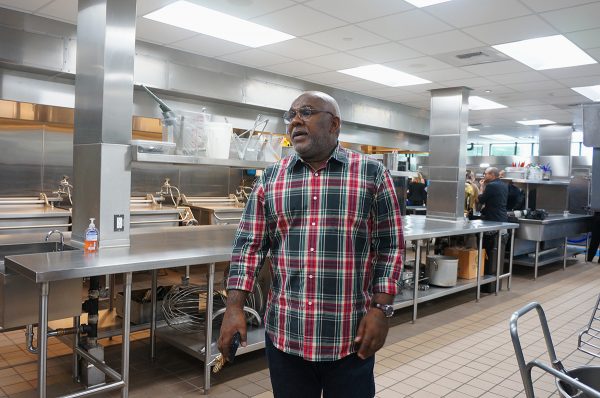
“We’re much more efficient this way,” Gordon continued. In the kitchen, the day begins at 8 a.m. Someone will pick music for the morning, setting a groove for staff as they sync up to review recipes, pack meals prepared from the day before, and cook meals for the next day ahead. After a lunch break, they continue to work until 4 p.m. to make sure they’re meeting the needs of the community they serve.
For locals like Celeste, a Project Angel Food client who is affected by multiple sclerosis, this service is crucial. On days the disability “really takes effect,” being able to receive nutritious meals customized to her needs makes a meaningful difference. “Some days, I’m not able to get up,” Celeste said. “Just that one meal [can] give me an extra boost [and] allow that sun to shine brightly even on my rainy days.”
For advocates and Project Angel Food supporters, Thursday’s celebration was also an act of resistance and a bold declaration against the federal administration. Jamie Lee Curtis, the honorary co-chair of the “Rise to the Challenge” campaign, spoke of the “love” that lay at the core of Project Angel Food’s foundation: a kind of love she finds completely absent in the federal administration.

“We are a community here today the same way they are in Minnesota, and I feel like what they’re doing is what we’re doing,” Curtis said to the crowd, defiance firm in her voice. “And we’re only going to get any shit done if we do it together and defy these motherfuckers.”
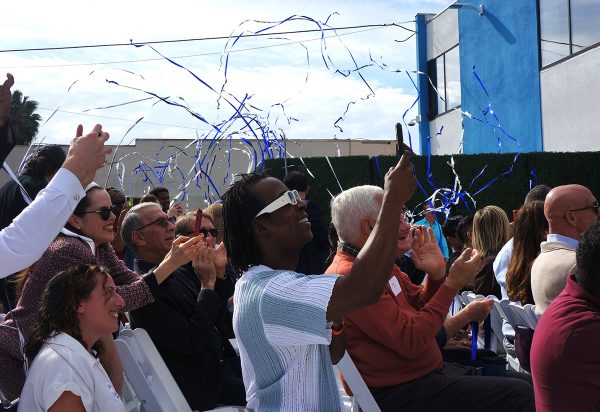
County supervisor Lindsey Horvath, a former delivery volunteer at Project Angel Food, affirmed this statement and guaranteed the county’s continued support in the organization. Horvath spoke of the government’s “glaring absence” during the HIV/AIDS epidemic: one that is “eerily similar” to its attitude now.
As the government mobilizes Immigration and Customs Enforcement (ICE) agents, sending immigrant communities spiraling into crisis, on-the-ground organizations like Project Angel Food are standing in firm support of their marginalized and ill community members. Horvath’s confirmation of county support is also rooted in this mission.
The building’s exterior also reflects the organization’s dedication to its residents. On the south side, a new large-scale mural painted by esteemed local muralist Robert Vargas highlights the stories of local volunteers and vendors who live and work in the neighborhood. Vargas explained that seeing these people in action “crystallized” the dedicated service and harmony that exists among the organization’s volunteers, clients, staff, and nearby community members.
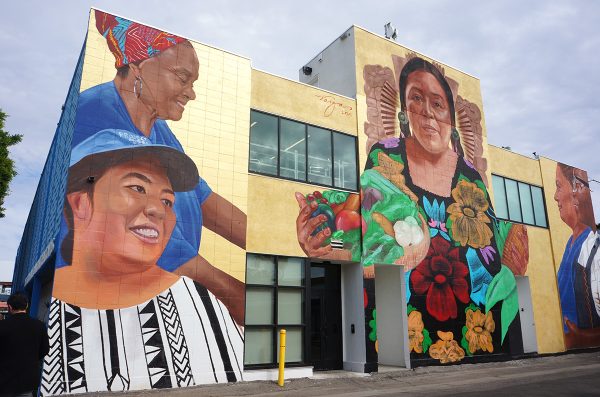
Next, the second building of the Chuck Lorre Family Foundation Kitchen and Campus begins construction this summer. This space will house the organization’s nutrition, volunteer, and client services and will also include its first department dedicated to research and policy. There will also be a training kitchen, where clients will be able to learn how to cook meals on their own.
As Project Angel Food’s growth continues, Ayoub hopes community members who are able to pitch in will do so. While public funding can feel unsteady, he explained, community strength and sustainment can fill those gaps of doubt. The organization is $2.3 million away from its goal in securing capital for this second building, and Lorre will match donations up to $1.5 million.
Kristie Song is a California Local News Fellow placed with the Los Angeles Blade. The California Local News Fellowship is a state-funded initiative to support and strengthen local news reporting. Learn more about it at fellowships.journalism.berkeley.edu/cafellows.
Arts & Entertainment
2026 Best of LGBTQ LA Readers’ Choice Award Nominations
Nominations for the Best of LGBTQ LA Awards are open from until February 15th!

It’s time to celebrate the vibrant and diverse LGBTQ+ community of Los Angeles! Nominations for the Best of LGBTQ LA Awards are open from until February 15th, giving you the chance to highlight your favorite local legends, hotspots, performers, and change-makers. Then, from February 23rd to March 6th, cast your vote for the finalists and help decide who truly represents the best of LGBTQ LA. The Best of LGBTQ LA Awards Party will be held on March 26th at The Abbey!
Use the form below or click the link HERE to nominate!
-

 Theater5 days ago
Theater5 days ago‘Incitation to the Dance’ asks what happens to love when a younger man cuts in
-

 New York5 days ago
New York5 days agoPride flag removed from Stonewall Monument as Trump targets LGBTQ landmarks
-

 Philippines5 days ago
Philippines5 days agoPhilippines Supreme Court rules same-sex couples can co-own property
-
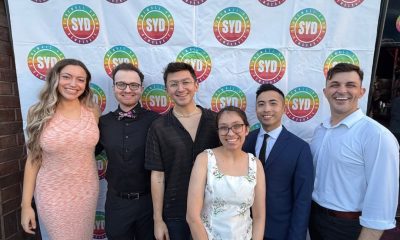
 Los Angeles4 days ago
Los Angeles4 days agoStonewall Young Democrats bounces back from “quiet year” with Hero Awards
-

 Florida5 days ago
Florida5 days agoDisney’s Gay Days ‘has not been canceled’ despite political challenges
-
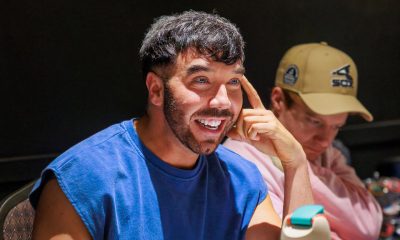
 a&e features2 days ago
a&e features2 days agoFrom ‘So Random’ to sexy theater: LA’s very own Mathew Scott Montgomery
-

 Los Angeles2 days ago
Los Angeles2 days agoA new “queer summer camp” cycling event rises from the legacy of AIDS/LifeCycle
-

 Transgender3 days ago
Transgender3 days agoTrans-led organization FLUX celebrates a decade of “transformative” service to TGI communities
-

 Commentary2 days ago
Commentary2 days agoWhat Grindr’s pricey new subscription says about the gays, intimacy, and capitalism in the age of AI

